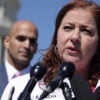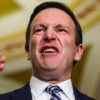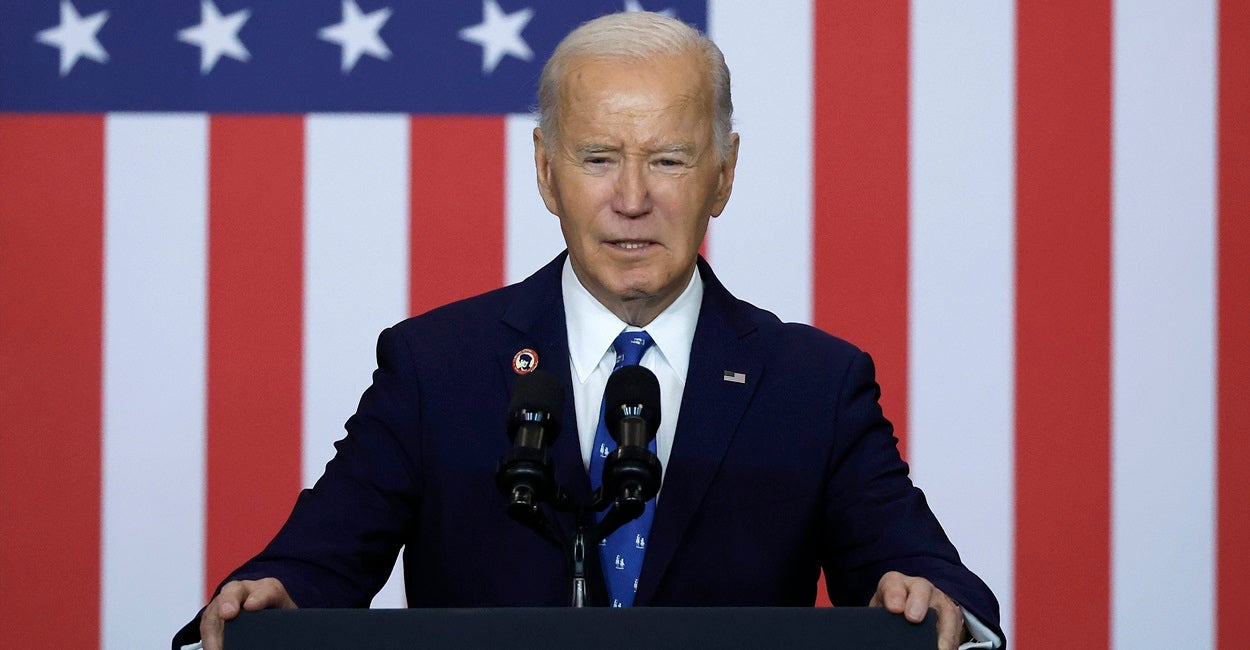As he leaves the White House, President Joe Biden isn’t forgetting Christmas gifts to China. This week he announced new Paris Agreement targets to reduce greenhouse gases and he issued a waiver to California to attempt to do away with the American internal combustion engine.
Biden’s actions would require purchases of additional Chinese-made renewables and batteries, as well as critical minerals. These initiatives, taken as Biden walks out the White House door, strengthen China’s economy at the expense of America’s economy, and result in more jobs for Chinese and fewer for Americans.
President-elect Donald Trump ran on a platform of ensuring that America uses its oil and natural gas, and that people can choose what car to buy. If he fulfills his campaign promises, he will roll back Biden’s latest actions.
The Daily Signal depends on the support of readers like you. Donate now
1. Reducing Greenhouse Gases
Calling climate change “an existential threat,” Biden has announced new targets to cut U.S. emissions by 64% by 2035 from 2005 levels, up from his prior target of 50%, in order to meet goals under the United Nations Paris Agreement. His new target can be met, he says, “while reducing consumer costs, creating new jobs, driving innovation, protecting public health, and growing a stronger, fairer economy.”
No matter that Trump will likely withdraw from the Paris Agreement when he takes office; that government regulations on reducing emissions cost more, rather than less; and that it is not fair to raise electricity and transportation costs on poor people, who pay a disproportionate share of their income on energy.
Tougher targets benefit China because the resulting higher U.S. energy prices will drive energy-intensive manufacturing offshore to China, just as European manufacturing is coming to the United States due to high European energy prices.
China has increased its carbon dioxide emissions by 6 billion metric tons over the past 15 years, while the United States has lowered its emissions by 1 billion metric tons. Shipping American manufacturing to China, where it is made with dirtier, coal-fired power plants, does not reduce global emissions.
2. Battery Electric Vehicles
This month the Environmental Protection Agency has granted California a waiver for its rule that all new vehicles sold in the Golden State be plug-in hybrid or pure battery powered by 2035. California needed a waiver because the Clean Air Act does not allow states to set more rigorous vehicle emission standards than the federal government.
Another 13 states have signed up for California’s Advanced Clean Car II Rules. With the waiver, California and Biden can push car manufacturers to stop producing gasoline-powered vehicles.
This EPA action trades America’s energy security—its reliance on home-produced oil and natural gas—for dependence on batteries made in China, reportedly with slave labor from Xinjiang. America cannot produce these batteries at lower cost than can China.
Plus, electric vehicles are more expensive than equivalent gasoline-powered vehicles, and raise the costs of transportation for Americans—further weakening the U.S. economy. The mandate reduces safety, because people delay costly, new car purchases, and they continue to drive their older vehicles, which do not have the latest safety features. In addition, EVs are inconvenient to charge and batteries lose range in cold and hot climates.
Some might justify these gifts to China on the grounds that the world’s climate will benefit from lower emissions from U.S. decarbonization. But China is producing the wind turbines, solar panels, and batteries with coal, increasing global emissions.
As America gives China economic advantages this Christmas, Americans are left with the proverbial lump of coal in their stockings—coal that they are not even permitted to use. They face higher transportation costs, higher electricity costs, and lost jobs. Americans should know that such generous gifts are not required, especially to countries that enslave their people and steal intellectual property from the United States.
What one party giveth, another can take away. And as Congress changes, and President-elect Trump assumes office, new leadership may want to reconsider.
We publish a variety of perspectives. Nothing written here is to be construed as representing the views of The Daily Signal.






























